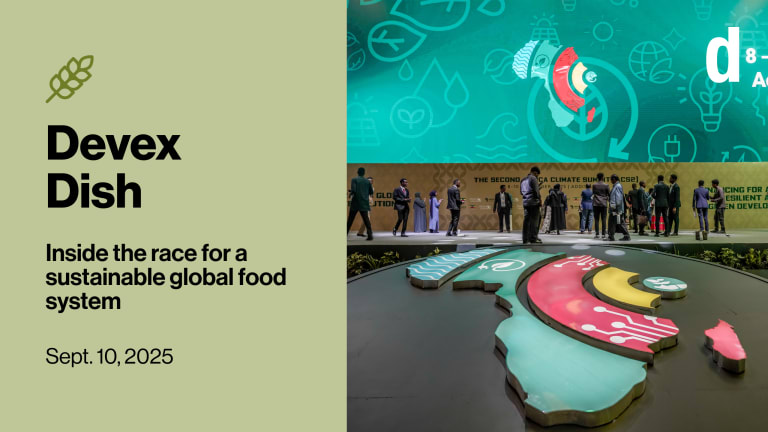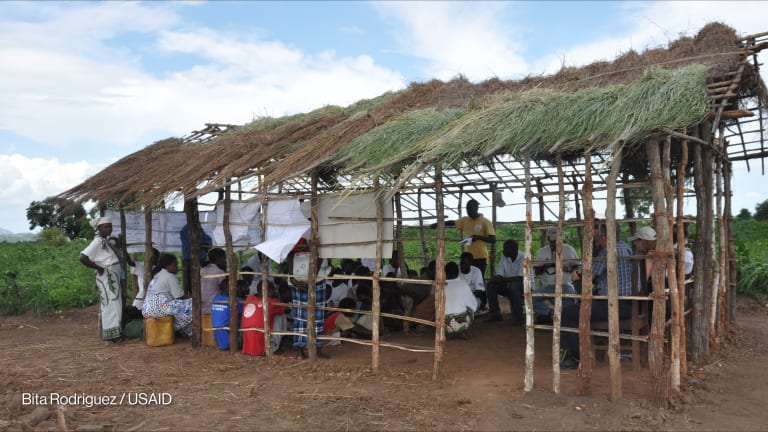
ABIDJAN — Sheep, goat, and cow carcasses lie scattered across the highway that leads from Mauritania’s capital Nouakchott inland to Magta-Lahjar, a village some 400 kilometers away. The grim evidence of malnutrition even among livestock meets the International Federation of Red Cross and Red Crescent Societies operations manager in Mauritania, Lancelot Mermet, on his journey hours before reaching his destination.
As a result of poor rainfall, livestock losses and pasture shortages are threatening food security across six West African Sahel countries. An estimated 7.1 million people in Burkina Faso, Mauritania, Mali, Senegal, Chad, and Niger are in need of urgent food and livelihood assistance.
Record-high food insecurity trends set to worsen in 2018
Ongoing conflict and environmental shocks have pushed 124 million people to live in food insecurity crises, according to the Food Security Information Network. Humanitarian groups are struggling to respond to the situation, but also trying to meld emergency actions together with longer term development goals.
The Sahel “lean season” — the period between harvests — typically begins around June as a precursor to the rainy season, which runs from July through September. But last year’s limited and sporadic rains meant smallholder farmers struggled to produce enough food for their families, making many dependent on the market for daily food items. In turn, market prices spiked and many men left villages to seek work in the capital, sending money back to family members in the countryside.
Coumba Sow, the Food and Agriculture Organization’s resilience, emergency, and rehabilitation officer for West Africa and the Sahel, told Devex they had already begun preparing for a particularly tough lean season by the end of last year.
“At [the] end of 2017, analysis looking at the agricultural campaign, harvest, markets, prices, [and] food security situation made it clear already that we were going to have a difficult lean season because of the lack of pasture, even though production was good in some parts,” she explained.
A meeting of the Permanent Inter-State Committee for Drought Control in the Sahel had also predicted “persistent food insecurity, exacerbated by the resurgence of armed attacks” in many affected regions.
Food insecurity is often acute around this time of year, but in 2018 it began as early as April, forcing pastoralists to move their herds earlier and further in search of pastures and water. Persisting insecurity has also limited access to some grazing areas across northern Mali and the Lake Chad region.
“There is a worrying humanitarian situation in the region: Lake Chad, weak economies, depreciation of local currencies, inflation and rainfall deficit, conflict, large movements of people. A lot of [things] that humanitarian action alone can’t fix,” Sow argued.
In Mauritania, Mermet said many pastoralists have sold assets and livestock at low prices, left the villages and moved to the capital to search for work.
“This is a highly vulnerable population. We have a chronic issue of malnutrition throughout the country so this is not new but ... this is the worst situation in the past five years,” he said.
After an extended dry season last year, rains this current season have also been sporadic, raising concerns of a situation as severe as that of the 2011-2012 Sahel food security crisis. For many of the countries affected, including Mauritania, it was the worst lean season on record, characterized by extreme levels of severe acute malnutrition and high mortality rates from diseases such as meningitis, measles, and cholera.
Already, the United Nations children’s agency, UNICEF, estimates that 1.6 million children across the six countries are at risk of severe acute malnutrition, 50 percent more than during the 2012 crisis.
“Now we are focused on the next few months because ... the rainy season is not as good as expected. If we continue on this trend we might reach the level of 2011,” Mermet added.
A confluence of factors
For pastoral and agropastoral communities, the effects of poor rainfall have been compounded by other factors.
In Chad, the food emergency is a result of difficulties accessing land and clean drinking water, climate change, and poor nutritional practices, amidst a deep economic crisis. Roughly half of the country has been declared in a state of “nutritional emergency,” according to Médecins sans Frontières. In addition, as the dryland pasture near Lake Chad was totally exhausted, grazing activities have become increasingly difficult due to the ongoing conflict.
In Mali, the number of internally displaced people due to conflict continues to rise in the central and northern regions. As of May 31, the U.N. Office for the Coordination of Humanitarian Affairs registered roughly 61,000 IDPs — a 50 percent increase on the number registered in December 2017 — and nearly 1 million people are at risk of human rights violations, such as torture at the hands of armed groups, with limited access to public services. Access to grazing in areas including Timbuktu and Gao, northern provinces where livestock normally gravitate, has also been restricted due to intercommunal fighting.
Caritas Développement Niger is blaming the nutritional challenges facing the country’s southeastern Diffa region on violent attacks by Boko Haram militants. The demand for livestock export also remains below average due to the weak exchange rate and the persisting conflict in Nigeria. Secretary General of Caritas Niger Raymond Yoro estimated that 1.4 million people require food assistance, many suffering from moderate acute malnutrition.
Looking ahead
While Sow and Mermet agreed that long-term development solutions are needed to avoid these yearly hardships, they also said that current nutrition levels require full focus on humanitarian, life-saving responses.
Three U.N. agencies — the World Food Programme, UNICEF and FAO — have developed a joint response to cover immediate food needs, protect livelihoods, and fight malnutrition. They are urgently calling for a collective $628 million to provide therapeutic food, access to water and sanitation, and education services until the end of the year.
Together, they are also working with local NGOs to outline long-term interventions that ensure the availability and access of local food sources to help communities better deal with shocks in the future.
FAO will specifically support restoration of cattle breeding programs by way of cash transfers and cash-for-work programs. They will also dedicate teams to rehabilitating water sources, animal vaccinations, and deworming, and providing basic inputs for agricultural production.
IFRC’s’ two-part action plan began in June with direct emergency food assistance using cash modalities to give recipients more responsibility and choice in determining their own needs, Mermet explained. From October, a livelihoods program will focus on long-term interventions, such as cattle distribution.
“If we don’t have long-term development to increase the resilience of these communities, we will still have lean season [and] issues of food security as we have for decades, and the cycle starts again,” Mermet said.
Meanwhile, Sow encouraged natural resource management, rehabilitation of pastures, and reinforcement of information and early warning services.
There is not yet a famine in the Sahel, she stressed. “Today we are talking about problems with access to food because the lean [season] started early so animals are weak, therefore whatever funds need to be channeled needs to happen now.”








